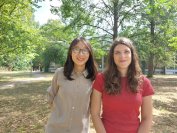Hengstberger Award 2022
Dr. Elisa Fresta und Dr. Yan Huang
Dr. Andreas Sander
Dr. Philipp Uhl und Dr. Florian Umstätter
2024, 2023, 2022, 2021, 2020, 2019, 2018, 2017, 2016, 2015, 2014, 2013, 2012, 2011, 2010, 2009, 2008, 2007, 2006, 2005, 2004
Bioelectronics: mimicking and interfacing biological systems
Symposium dates : 15.05. – 17.05. 2023
In our daily lives, we are surrounded by electronics employing mostly electrons as the charge carrier. This is not the case for biological systems; they use ions and molecules of varying sizes to transport charge. As well, conventional electronics do not function in water, which is, however, essential for living beings. Hence, interfacing biological samples and living tissue with conventional electronics is always a challenge. Thanks to the unique combination of both electronic and ionic conductivity in some organic polymers and small molecules, it has recently become possible to translate signals between the two realms, leading to the birth of bioelectronics.
In detail, bioelectronics deals with miniaturized implantable/wearable devices used to deliver electrical stimulation to biological systems to control a wide variety of bodily functions, or monitor the biological signals from cells and organs. This opens up immense opportunities but also the need for cooperation between electronics and biology, fostered by the rapid progress in both fields. Efforts are needed not only to design and improve material fabrication and device design, but also to deepen the current understanding of biological systems. During the symposium, the latest advances in the field will be presented and discussed, with a focus on wearable/implantable device design, neuromorphic devices and biosensors, novel biocompatible/biodegradable materials, and modelling of the biological-electronic interface as well as ionic-electronic mixed conduction.

Dr. Elisa Fresta
Humboldt Postdoctoral Fellow
Applied Physical Chemistry
Im Neuenheimer Feld 253
69120 Heidelberg
efresta@uni-heidelberg.de
Dr. Yan Huang
Humboldt Postdoctoral Fellow
Applied Physical Chemistry
Im Neuenheimer Feld 253
69120 Heidelberg
yhuang@uni-heidelberg.de
Exploring the massive-star origin of our elements: A unified understanding of stellar yields
Symposium dates : 04.09. - 08.09.2023
The chemical elements that determine our daily lives were produced by generations of stars. In fact, all elements heavier than helium would not exist without stars. Massive stars, defined as those with initially 8 or more times the mass of our Sun, are particular key players in this so-called nucleosynthesis. Yet, we lack a proper quantitive understanding of all the processes participating in the production and distribution of chemical elements. Improving this situation is essential as our knowledge about the origin of the elements affects our view on astrophysics on all scales, ranging from the origin of water in our solar system up to the formation of whole galaxies in our Universe.
In the Hengstberger-Symposium "Exploring the massive-star origin of our elements" we focus on the particularly crucial impact of massive stars to the origin of our elements. In the last two decades, our picture of massive star evolution has become a lot more clear, but also significantly more complex: For example, we now know that not all massive stars explode as a supernova at the end of their lives, but a significant fraction collapses directly into black holes, thereby fundamentally changing their elemental contributions to the Universe. To discuss the impact of these and many other recent scientific results, we are bringing together researchers from different astrophysical fields such as stellar winds, supernova explosions, and galaxy evolution. A particular focus will be the inclusion of a large fraction of junior and early-career scientists to disseminate knowledge beyond traditional fields and plant a seed for new collaborations to gain a coherent understanding of the origin of our elements.

Dr. rer. nat. Andreas Sander
Astronomisches Rechen-Institut (ARI), Zentrum für Astronomie (ZAH) der Universität Heidelberg
Universität Heidelberg
Mönchhofstr. 12-14
andreas.sander@uni-heidelberg.de
Antimicrobial research: The fight against the pandemic
Symposium dates : 17.03. - 19.03.2023
The discovery and use of antibiotics represent a major milestone in the history of medicine. Not even 150 years ago, due to the absence of adequate treatment options, an apparently harmless injury could lead to significant health problems or even death. Today, bacterial infections can be treated with a variety of different antimicrobial agents. Accelerated by an excessive or inappropriate use of these compounds, more and more bacterial pathogens are developing resistance to most of the antibiotics available on the market. In this context, the progressive bacterial resistance development is often called the “silent pandemic”. In order to prevent medicine from entering a pre-antibiotic era, research and development of new antibacterial substances is more important than ever before. Despite this great need for innovation, the industry has largely withdrawn from antibiotics research, primarily for economic reasons. The lion’s share of the antimicrobial research is therefore with the academics. Due to the complexity of drug development, academic research is dependent on cooperation and funding opportunities.
The Hengstberger symposium "Update on antimicrobial research: Joint struggle against the silent pandemic" brings together academic groups from various antimicrobial research areas with representatives from industry in order to start academic and industrial collaborations and to promote scientific discourse.
 |
 |
|
Dr. rer. nat. Philipp Uhl
Universitätsklinikum Heidelberg Abt. Nuklearmedizin, Radiopharmazie[UP1] Im Neuenheimer Feld 400 69120 Heidelberg
philipp.uhl@med.uni-heidelberg.de |
Dr. rer. nat. Florian Umstätter 69120 Heidelberg |

